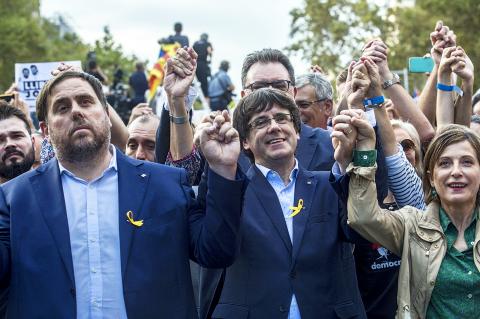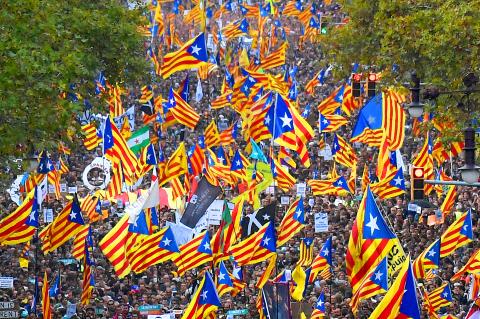Catalonia’s separatists yesterday were planning their response after Spain on Saturday took drastic steps to stop the region from breaking away by dissolving its separatist government and forcing new elections.
Catalan President Carles Puigdemont and his regional executive — who sparked Spain’s worst political crisis in decades by holding a banned independence referendum on Oct. 1 — are to be stripped of their jobs and their ministries taken over under measures announced by Spanish Prime Minister Mariano Rajoy.
“Yesterday there was a fully-fledged coup against Catalan institutions,” Catalan government spokesman Jordi Turull told Catalunya Radio. “What happens now, with everyone in agreement and unity, is that we will announce what we will do and how.”

Photo: Bloomberg
Rajoy has taken Spain into uncharted legal waters by moving to wrest back powers from the semi-autonomous region, which could see Madrid take control of the Catalan police force and replace its public media chiefs.
The move sparked outrage among separatists, with nearly half a million taking to the streets of regional capital, Barcelona, on Saturday and Puigdemont declaring Rajoy guilty of “the worst attack on institutions and Catalan people” since the dictatorship of Francisco Franco.
Among other repressive measures, Franco took Catalonia’s powers away and banned official use of the Catalan language.

Photo: AFP
Though Catalans are deeply split on whether to break away from Spain, autonomy remains a sensitive issue in the northeastern region of 7.5 million people, which fiercely defends its language and culture, and has previously enjoyed control over its policing, education and healthcare.
Rajoy said he had no choice but to force Puigdemont out as he refuses to drop his threat to declare independence after a referendum that had been declared unconstitutional.
Responding to accusations of a “coup,” Spanish Minister of Foreign Affairs Alfonso Dastis yesterday told BBC television: “If there is a coup d’etat, it is one that has been followed by Mr Puigdemont and his government.”
“What we are doing is following strictly the provisions of our constitution,” he said.
However, asked if Puigdemont would be arrested if he shows up for work or the army brought in to enforce order, Dastis promised no arrests would be made when the Catalan government is dismissed.
“We are not going to arrest anyone,” he said. “All the government is trying to do is reinstate the legal order, restore the constitution but also the Catalan rules and proceed from there.”
However, he said that if Puigdemont’s government keeps trying to give orders, “they will be equal to any group of rebels trying to impose their own arbitrariness on the people of Catalonia.”
The Spanish Senate is set to approve the measures by the end of next week. Rajoy’s conservative Popular Party (PP) holds a majority in the upper house, while other major parties also back his efforts to prevent a break-up of the nation.
Rajoy has ordered fresh elections to be called within six months of the Senate hearing, which would see polls held by mid-June next year at the latest.
Separatist parties of all political stripes, from Puigdemont’s conservatives to the far-left, have dominated the Catalan parliament since the last elections in 2015, holding 72 seats out of 135.
Ahead of a meeting of Catalan parties today to set a date and agenda for a crucial session of the regional parliament to debate next steps, Turull insisted on RAC1 radio that elections were “not on the table.”
Political analysts said Rajoy faces a serious struggle to impose control over the region. Potential scenarios include Catalan civil servants and police refusing to obey orders from central authorities.
“The basic problem is that you have to govern Catalonia with the active opposition of a large part of the population,” analyst Jose Fernandez-Albertos said.
Additional reporting by Bloomberg

The CIA has a message for Chinese government officials worried about their place in Chinese President Xi Jinping’s (習近平) government: Come work with us. The agency released two Mandarin-language videos on social media on Thursday inviting disgruntled officials to contact the CIA. The recruitment videos posted on YouTube and X racked up more than 5 million views combined in their first day. The outreach comes as CIA Director John Ratcliffe has vowed to boost the agency’s use of intelligence from human sources and its focus on China, which has recently targeted US officials with its own espionage operations. The videos are “aimed at

STEADFAST FRIEND: The bills encourage increased Taiwan-US engagement and address China’s distortion of UN Resolution 2758 to isolate Taiwan internationally The Presidential Office yesterday thanked the US House of Representatives for unanimously passing two Taiwan-related bills highlighting its solid support for Taiwan’s democracy and global participation, and for deepening bilateral relations. One of the bills, the Taiwan Assurance Implementation Act, requires the US Department of State to periodically review its guidelines for engagement with Taiwan, and report to the US Congress on the guidelines and plans to lift self-imposed limitations on US-Taiwan engagement. The other bill is the Taiwan International Solidarity Act, which clarifies that UN Resolution 2758 does not address the issue of the representation of Taiwan or its people in

US Indo-Pacific Commander Admiral Samuel Paparo on Friday expressed concern over the rate at which China is diversifying its military exercises, the Financial Times (FT) reported on Saturday. “The rates of change on the depth and breadth of their exercises is the one non-linear effect that I’ve seen in the last year that wakes me up at night or keeps me up at night,” Paparo was quoted by FT as saying while attending the annual Sedona Forum at the McCain Institute in Arizona. Paparo also expressed concern over the speed with which China was expanding its military. While the US

SHIFT: Taiwan’s better-than-expected first-quarter GDP and signs of weakness in the US have driven global capital back to emerging markets, the central bank head said The central bank yesterday blamed market speculation for the steep rise in the local currency, and urged exporters and financial institutions to stay calm and stop panic sell-offs to avoid hurting their own profitability. The nation’s top monetary policymaker said that it would step in, if necessary, to maintain order and stability in the foreign exchange market. The remarks came as the NT dollar yesterday closed up NT$0.919 to NT$30.145 against the US dollar in Taipei trading, after rising as high as NT$29.59 in intraday trading. The local currency has surged 5.85 percent against the greenback over the past two sessions, central